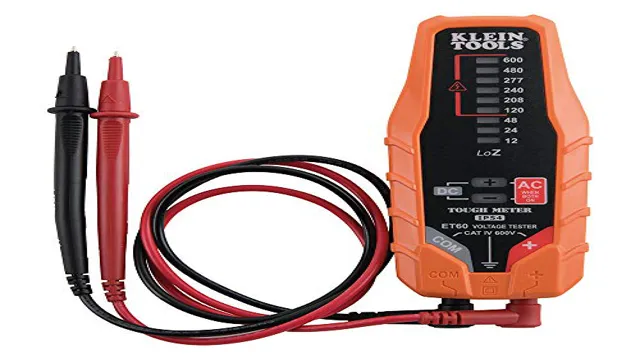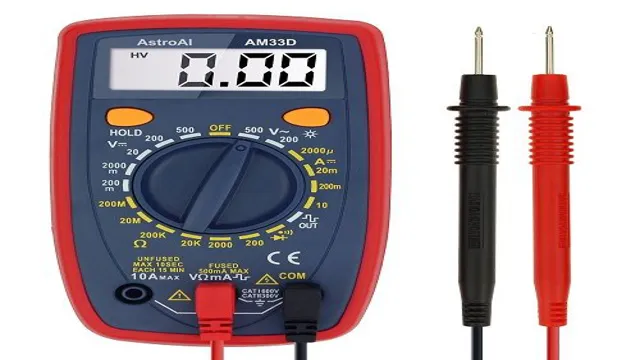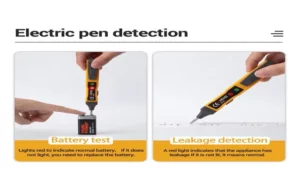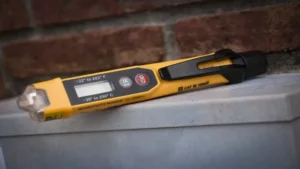When it comes to testing electrical equipment, there are two devices that often get confused for one another: voltage testers and multimeters. While both devices perform similar functions, they are not the same, and it is essential to understand the difference between them. Voltage testers are a basic tool used to determine if there is a live electrical current in a specific area.
They are easy to use and often a more affordable option than multimeters. However, voltage testers only measure the presence of electricity and cannot provide additional information such as voltage levels or resistance measurements. On the other hand, multimeters are a more advanced and versatile tool that measures not only the presence of electricity but also the amount of voltage and resistance.
They often come with additional features such as continuity testing and diode testing, making them an excellent choice for diagnosing issues in electrical systems. So, when should you use a voltage tester versus a multimeter? Think of it this way: a voltage tester is like a thermometer, providing a simple yes or no answer, while a multimeter is like a thermometer, providing a more detailed and comprehensive diagnosis. Ultimately, the device you choose will depend on your needs and level of expertise.
If you’re a beginner or only need to identify the presence of electricity, a voltage tester will be sufficient. However, if you require more precise measurements and details on electrical systems, a multimeter is the way to go.
Understanding Voltage Testers
Many people confuse a voltage tester with a multimeter, but they are not the same thing. While both are used to measure electrical current, a voltage tester is simpler and less versatile than a multimeter. A voltage tester, also called a voltage detector or a non-contact tester, is used to detect the presence of voltage in an electrical circuit without making direct contact.
It is essentially a pen-shaped tool with a sensor that beeps or flashes when it comes close to a live wire. This makes it a quick and easy tool for basic electrical safety checks and troubleshooting. On the other hand, a multimeter is a more precise and versatile tool that can measure voltage, current, resistance, and other electrical parameters.
It usually has a digital or analog display and requires direct contact with the circuit being tested. So, while a voltage tester can be handy for simple voltage detection, a multimeter is needed for more complex electrical testing and diagnosis.
– Definition of a Voltage Tester
A voltage tester is an electrical device used to measure the voltage levels present on an electrical circuit. These testers are essential tools for electricians, contractors, and DIY enthusiasts alike as they help determine if an electrical circuit is “hot” or “live”. By using a voltage tester, you can identify if the electrical current is flowing through a wire and how much voltage is present.
As a result, you can quickly identify if a circuit is faulty, which can help prevent damage to equipment or even injury. Voltage testers typically come in different types, such as non-contact voltage testers, digital multimeters, or analog voltage testers. Depending on your needs, you may choose to use a specific type of voltage tester.
With the correct use of these testers, you can ensure electrical safety when dealing with electrical circuits.

– Types of Voltage Testers
If you are a DIY enthusiast or an electrician, a voltage tester is an essential tool in your arsenal. Voltage testers are designed to detect the presence of electrical voltage in a circuit, allowing you to determine if it is safe to work on electrical equipment or not. There are different types of voltage testers available in the market, including non-contact testers, contact testers, and multimeters.
Non-contact testers do not require direct contact with the electrical circuit and can detect voltage through walls or insulation. Contact testers, on the other hand, require direct contact with the circuit and are used for live voltage detection. Multimeters, meanwhile, are the most versatile type of voltage testers and can detect and measure voltage, current, and resistance.
Before using a voltage tester, it is crucial to read the manufacturer’s instructions and guidelines. Safety should always be your top priority when working with electrical equipment to avoid accidents and injuries.
– Advantages of a Voltage Tester
Voltage Tester Voltage testers are essential tools used by electricians to check whether a circuit is functioning properly and, most importantly, if the electrical voltage present is safe to work with. They come in various forms, from simple non-contact testers to advanced models equipped with all the latest features and functions. Some of the advantages of voltage testers include their accuracy, user-friendliness, and versatility.
Additionally, they can save electricians time and money, and eliminate the need for guesswork in determining the state of a circuit. For example, voltage testers can detect the presence of stray voltage or identify electrical hazards that may cause serious injury or death. Overall, voltage testers are indispensable tools for any electrician or electronics enthusiast, helping users stay safe while working with electricity and ensuring that circuits are operating as intended.
Multimeters: More Than a Voltage Tester
If you’re confused about whether a voltage tester and a multimeter are the same thing, the short answer is no, they’re not. A voltage tester is a tool that’s specifically designed to detect the presence of electrical current in a wire, outlet, or circuit. It’s a simple device that typically has two probes and an indicator light or sound to signal whether or not there’s voltage.
On the other hand, a multimeter is a more advanced device that can measure voltage, current, resistance, capacitance, and other electrical parameters. It’s a versatile tool that can be used for a range of electrical tasks, including troubleshooting, repairs, and installations. So, while a voltage tester is a handy tool to have in your electrical toolkit, a multimeter offers a lot more functionality and flexibility.
Whether you’re a professional electrician or a DIY enthusiast, a multimeter is an essential tool that can help you tackle a wide range of electrical challenges.
– Definition of a Multimeter
A multimeter is a handy tool that provides more than a simple voltage reading. It’s essentially an all-in-one device that can read voltage, current, and resistance levels. This gadget can also detect continuity in a circuit.
It’s an indispensable tool for any electrician, DIY enthusiast, or anyone who wants to troubleshoot and diagnose problems with electrical appliances. Without a multimeter, it’s challenging to correctly identify problems in electrical devices. Using a multimeter, you can quickly identify if there’s a current flow, if circuits are closed or open, and if components such as transistors, resistors, and capacitors are functioning correctly.
In short, a multimeter is a versatile tool that is essential in every electrician’s toolkit.
– Types of Multimeters
Multimeters are versatile tools that offer much more than just voltage testing. They come in different types and can measure various electrical quantities such as current, resistance, and capacitance. The most common type is the digital multimeter, which displays readings on a digital screen.
It offers more accuracy and precision than the analog multimeter, which uses a needle and dial to display readings. There is also the clamp multimeter, which measures AC current by clamping around a wire, and the autoranging multimeter, which automatically selects the appropriate measurement range. Each type of multimeter has its own unique features to suit different electrical applications.
When choosing a multimeter, it is crucial to consider the type of measurement required and the accuracy level needed to ensure the best results.
– Advantages of a Multimeter
Multimeters Multimeters are invaluable tools for electricians, electronic technicians, and DIY enthusiasts. Unlike voltage testers, multimeters offer a range of functionalities that can test not only voltage, but also current, resistance, and continuity, among other things. This means that a single device can be used to troubleshoot a wide range of electrical issues, and is therefore a more cost-effective and efficient tool to have on hand.
Multimeters also come in both analogue and digital versions, each with their own advantages. Analog multimeters offer a more intuitive readout, while digital multimeters are more precise and easier to read. Additionally, some multimeters even come with advanced features like frequency measurement and temperature probes, making them even more versatile and useful.
In short, if you’re serious about electrical work, investing in a multimeter is a no-brainer.
Key Differences Between Voltage Testers and Multimeters
Many people might wonder if a voltage tester is the same as a multimeter, and the answer is no. While both tools can be used to measure electrical measurements, there are some key differences. A voltage tester is a simple device that can only measure the presence or absence of voltage, usually through an audible or visual indication.
In contrast, multimeters are more sophisticated and can measure a variety of electrical properties, such as voltage, current, resistance, continuity, and capacitance. Additionally, multimeters can also display more detailed information, such as the exact voltage reading, while voltage testers are limited to simply detecting voltage. Therefore, while both tools serve a purpose in electrical testing, multimeters are more versatile and precise, while voltage testers are better suited for quick and simple checks.
– Functionality and Features
Voltage Testers, Multimeters, Key Differences When it comes to electrical work, having the right equipment is crucial. Two essential items in any electrician’s toolkit are the voltage tester and the multimeter. While they may seem similar, there are some key differences between the two.
A voltage tester is designed to check for the presence of electrical current in a wire or device. It’s a simple tool that is easy to use and often has a light or sound to indicate the presence of power. In contrast, a multimeter is a more complex device that can measure voltage, current, and resistance.
It’s a versatile tool that can provide a wide range of readings, making it a go-to for troubleshooting electrical issues. While a voltage tester is great for checking for power and verifying circuits, a multimeter is needed for more advanced electrical tests. So, if you’re looking to add to your electrical toolkit, consider whether you need a voltage tester or a multimeter, or both.
– Price and Availability
When it comes to price and availability, voltage testers are generally less expensive and more widely available than multimeters. Voltage testers are essential tools for any electrician or DIY enthusiast, and they are often less expensive than multimeters because they have fewer features and functions. Most hardware stores, online retailers, and electrical supply stores carry voltage testers, making them easily accessible.
On the other hand, multimeters are usually more expensive and can have a steeper learning curve, as they have more complex functions, such as measuring resistance, continuity, and current. Multimeters are also often sold in specialized electronic stores, limiting their availability. So, if you’re looking for a basic tool to test if a circuit is live or not, a voltage tester would be sufficient and more affordable.
However, if you need to measure different electrical properties and have a more comprehensive tool, a multimeter would be the right choice.
When to Use a Voltage Tester vs Multimeter?
When it comes to electrical work, it’s important to have the right tools for the job. Two tools that often get confused with one another are voltage testers and multimeters. While they both measure electrical activity, they serve different purposes.
A voltage tester is typically used to check if there is voltage present in an electrical current without giving specific readings. It’s a quick and simple tool for detecting power presence, but it lacks the precision and versatility of a multimeter. A multimeter, on the other hand, can measure not only voltage but also current and resistance.
It provides precise numerical readings and is more versatile than a voltage tester. So, if you need to check if there is voltage present, a voltage tester will do the job. But, if you need to measure electrical values accurately and precisely, a multimeter is the way to go.
Remember, a voltage tester is not the same as a multimeter. Each tool has its own unique purpose and should be used accordingly.
Conclusion
While both a voltage tester and a multimeter can be used to measure voltage, it’s like comparing a basic hammer to a Swiss Army Knife. A voltage tester can indicate the presence of voltage and quickly test for continuity, but a multimeter can provide a range of measurements and functions, including resistance, current, and frequency. So, while they may share some similarities, a multimeter definitely has the upper hand in terms of versatility and capabilities.
“
FAQs
What is a voltage tester?
A voltage tester is a tool that is used to check if an electrical circuit is live or not.
What is the difference between a voltage tester and a multimeter?
A voltage tester only checks for the presence of voltage while a multimeter can measure a wide range of electrical properties such as voltage, current, and resistance.
Can a multimeter be used as a voltage tester?
Yes, a multimeter can be used as a voltage tester as it can measure voltage. However, a voltage tester cannot be used as a multimeter as it can only detect the presence of voltage.
Is it safe to use a voltage tester on live circuits?
Yes, voltage testers are designed to be used on live circuits. However, it is important to follow safety procedures and instructions when using them.
What types of voltage testers are available?
There are two main types of voltage testers – contact and non-contact. Contact voltage testers require physical contact with the circuit while non-contact voltage testers can detect voltage from a distance.
Can a voltage tester be used to test batteries?
No, a voltage tester is designed to test AC voltage. A multimeter would be a better tool to test batteries as it can measure DC voltage.
Do voltage testers require batteries?
Yes, some voltage testers require batteries to operate while others do not. It is important to check the manufacturer’s instructions for each specific voltage tester.






